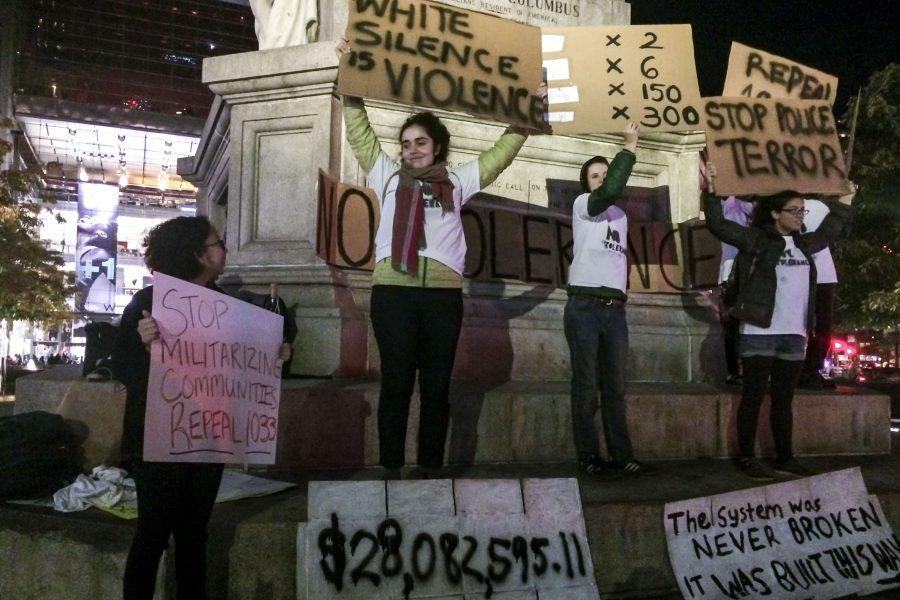Student Fights Police Brutality With NO TOLERANCE Movement
Student protesters called for gun reform at Columbus Circle.
November 7, 2016
Students demanded justice at Columbus Circle on Saturday night. Freshmen from NYU, Bennington College and Drew University chanted “disarm the police” and “white silence is violence” from the steps of Christopher Columbus’ statue. They also unfurled a homemade cardboard sign at the edge of the steps that said “NO TOLERANCE.”
This was the first action from the No Tolerance Movement, founded by Tisch freshman Kiyomi Calloway. It was created over the summer when she and her friends brainstormed ways to fight police brutality while promoting racial equality.
“We are a student-run group led by black lives and allies using rookie knowledge to channel our passion for justice,” Calloway said. “We hope to tackle politics regarding race relations and gun reform in the U.S. through protests and legislative changes.”
The organization focuses on legislative change to protect persecuted communities. At the protest, students explained to passersby the issues the No Tolerance Movement aims to address, including elimination of police brutality and militarization.
Another issue it aims to eradicate is the 1033 program, and Bennington College freshman Syd Miller said it is a Department of Defense program that allows domestic police systems to operate and obtain military equipment not being used in war. This system is free and under very little supervision.
“It’s a really abused program, and is basically creating a standing military in the United States,” Miller said. “In total, there are 6,221 pieces of equipment that have been obtained through this program as of 2014, the cost of which is $28,082,595.11.”
While some spectators ignored the protesters, other stopped to commend them. Brian Phillips, who stopped at Columbus Circle with his daughter, said that the efforts were respectable, but that he felt the arguments were not fully developed.
“I think it’s great to see kids protesting and stuff and taking advantage of their first amendment rights, but I think people need to really educate themselves before taking things to the streets,” Phillips said.
Phillips, who is not black, said that the issue of police brutality and marginalization is not necessarily a matter of race.
“I really have a problem with Black Lives Matter, because they don’t go to Chicago when 47 people are shot in the weekend — it’s upsetting to me,” Phillips said. “I live in the South Bronx. I’ve been a victim of this too. It goes beyond color lines. The justice system doesn’t come for you if you don’t have money. It’s not justice for all.”
However, Tisch freshman Isabel Asuncion, one of the main New York No Tolerance Movement organizers, thinks this can have concrete results and said that having a youth-based movement is especially important.
“I think with students compared to adults, we’re a lot more optimistic, and I think we have more energy to put a lot more effort into these movement,” Asuncion said. “If we care about issues and want our lives to improve, we are the [ones] who have to go forward and do something about it ourselves because we can’t expect other people to do it
for us.”
Calloway and her collaborators contacted major schools cities across the county, and she even traveled to Washington D.C. over the weekend to support the No Tolerance Movement’s protest there.
She said that while she dedicates a great deal of time to the cause, her efforts do not feel like a sacrifice compared to the pain of police brutality and militarization victims.
“I have to keep them in the back of my mind … always reminding myself, ‘what you’re doing is nothing compared to the pain these families feel,’” Calloway said. “[The protest] was just such a humbling experience, and I’m so excited to move forward.”
A version of this article appeared in the Monday, Nov. 7 print edition. Email Natasha Roy at [email protected].























































































































































